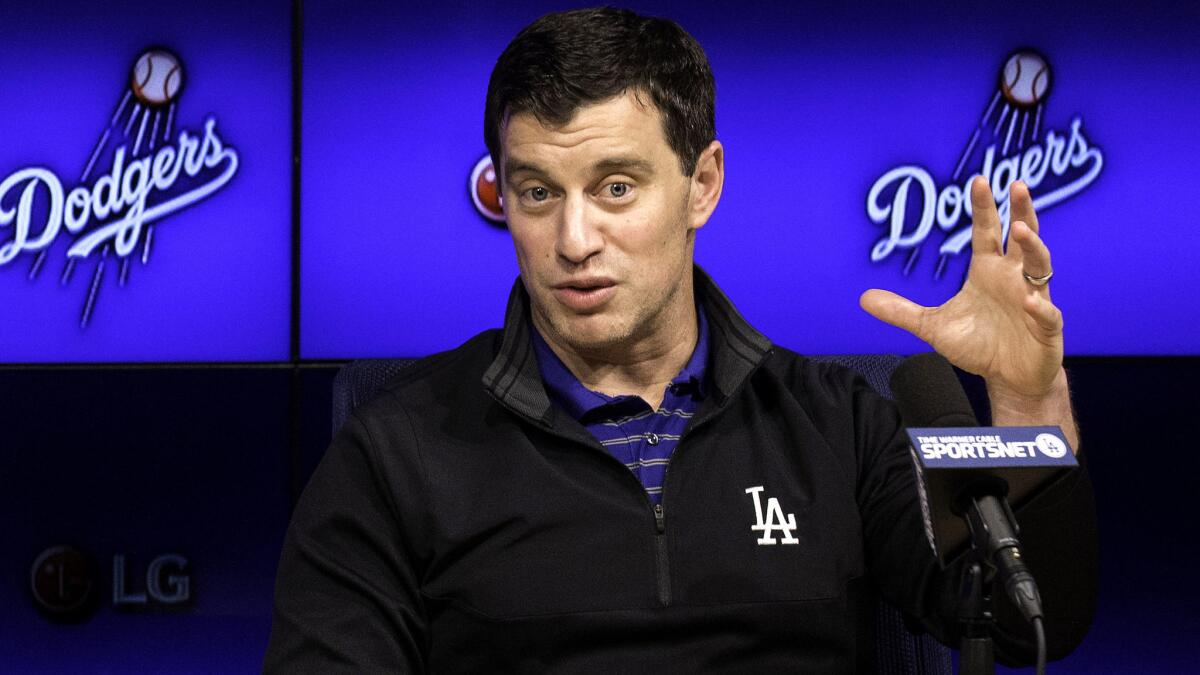Don Mattingly makes a decision, and Dodgers’ Andrew Friedman gets to make his choice

Andrew Friedman, the Dodgers’ president of baseball operations, explains to reporters how Don Mattingly departing as manager was a mutual decision.
- Share via
Would someone around here please make a decision?
In Anaheim, ownership declined to choose sides between Jerry Dipoto and Mike Scioscia. The mandate: make it work. But it would not work, and finally Dipoto took it upon himself to make the decision. He left. He was better off for it and, with the siege of uncertainty lifted, so were the Angels.
In Los Angeles, ownership deflected the decision on Don Mattingly to Andrew Friedman. There was talk of Mattingly staying another year, maybe more, but not for the kind of tenure that would make the manager feel he was Friedman’s guy. So Mattingly took it upon himself to make the decision. He left. He ought to be better off for it, and so too the Dodgers, without the constant backdrop of when Friedman might bring in his own guy.
Friedman should have done that a year ago, when the Dodgers’ owners hired him as president of baseball operations, but the owners still had Mattingly’s back. By the end of this season, Friedman should have known Mattingly well enough to hand him a pink slip or a contract extension, not engage him in hours of discussions about the who, what, when, and why of future decision-making at Dodger Stadium.
No one would have begrudged Friedman the chance to say, “We’re going in another direction.” Mattingly understands how the game is played. He thought he would succeed Joe Torre as manager of the New York Yankees in 2007, but the Yankees went in another direction and hired Joe Girardi.
So Mattingly came west with Torre, as his coach and later his successor. Now Mattingly figures to go east, although he insisted he did not leave because he had a deal lined up with the Miami Marlins, or anyone else. We’ll find out soon enough.
“I made a decision that really is the best right now,” Mattingly said.
That came toward the very end of the 18-minute conference call the Dodgers arranged for Mattingly, which followed the 40-minute news conference the Dodgers arranged for Friedman and General Manager Farhan Zaidi. At the very end of the call, Mattingly again slipped from the script about a mutual parting, in expressing his regret about leaving his coaches to fend for themselves.
“It was a decision that I had to make,” Mattingly said. “At times you have to do things that are the best for yourself.”
So now Friedman gets to do what is best for himself, to work with a manager that he hires. That is really what this is about.
This is not about the Dodgers losing Game 5 of the National League division series; an analytically inclined front office knows better than to make a decision based on one game out of 167. This is not about a sabermetric front office against an old-school manager; Mattingly bent over backward to embrace the torrent of data flowing from the front office to the clubhouse, and the considerable input from the humans in the executive suites.
“I think it’s great, honestly,” Mattingly said. “I think the information is really good. Do I agree 1,000% with everything that comes through it? Probably not. That has nothing to do with loving information.”
Friedman said he hoped to have a new manager in place by baseball’s winter meetings. That is not for another two months, so the candidate pool — real and rumored — should be enormous. For now, the Dodgers start with five candidates: Chicago Cubs bench coach Dave Martinez, Dodgers minor league director Gabe Kapler, former San Diego Padres manager Bud Black, and Dodgers coaches Tim Wallach and Ron Roenicke.
Those Dodgers fans clamoring for the return of a prodigal son — Scioscia or Dusty Baker — should be reminded that a manager’s job has changed these days, and not only at Dodger Stadium. Experience as a manager is an asset, not a requirement.
Today’s manager is more of a middle manager, a politician within the organization and a corporate spokesman representing the organization, a front man for the team at a time the balance of power has shifted from the dugout to the front office.
The Dodgers could go young at manager. Zaidi said the team should get younger, and so the manager would need to be “a teacher and a leader, and somebody who can help guys get over the hump to the big leagues.”
Friedman might well bring in some players and get rid of others before settling on the manager. That makes sense, because Friedman now has the chance to remake the organization in his image. He has made sweeping changes to the minor league staff and the scouting staff, with changes coming this fall to the major league coaching staff and the athletic training staff.
The highest-paid executive in baseball history now is fully accountable for the highest-paid team in baseball history. Game on.
Twitter: @BillShaikin
More to Read
Are you a true-blue fan?
Get our Dodgers Dugout newsletter for insights, news and much more.
You may occasionally receive promotional content from the Los Angeles Times.







